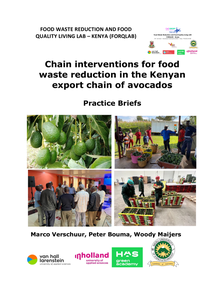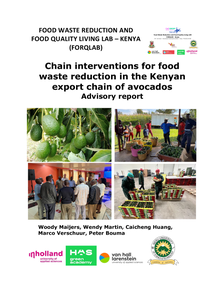Analyse the results from a representative selection of the supply chain studies for school feeding programmes in Kenya, Ghana and Mali, and make specific suggestions for interventions that can efficiently include SHF in the supply chains.
DOCUMENT

Western-European consumers have become not only more demanding on product availability in retail outlets but also on other food attributes such as quality, integrity, and safety. When (re)designing food supply-chain networks, from a logistics point of view, one has to consider these demands next to traditional efficiency and responsiveness requirements. The concept ‘quality controlled logistics’ (QCL) hypothesizes that if product quality in each step of the supply chain can be predicted in advance, goods flows can be controlled in a pro-active manner and better chain designs can be established resulting in higher product availability, constant quality, and less product losses. The paper discusses opportunities of using real-time product quality information for improvement of the design and management of ‘AgriFood Supply Chain Networks’, and presents a preliminary diagnostic instrument for assessment of ‘critical quality’ and ‘logistics control’ points in the supply chain network. Results of a tomato-chain case illustrate the added value of the QCL concept for identifying improvement opportunities in the supply chain as to increase both product availability and quality. Future research aims for the further development of the diagnostic instrument and the quantification of costs and benefits of QCL scenarios.
DOCUMENT

Food security depends on a network of actors and elements working together to produce and deliver healthy, sustainable, varied, safe and plentiful food supply to society. The interactions between these actors and elements must be designed, managed and optimized to satisfy demand. In this chapter we introduce Food Supply Chain Optimization and Demand, providing a framework to understand and improve food security from an operational and strategic point of view.
DOCUMENT
Banana is an important commercial fruit crop for smallholder farmers in Arba Minch, southern Ethiopia. However, its sector is experiencing many constraints and limited attention given to productivity and marketing. Therefore, this study was conducted to analyze the banana value chain in order to identify constraints on productivity and marketing, and possibilities of improvements towards a sustainable value chain in Arba Minch. Data were collected through a survey, key informants’ interviews, and focus group discussions. Different analytical and statistical tools were used for data analysis. Results describe actors, supporters, and influencers of the existing banana chain. The current banana chain has three different distribution channels in Arba Minch. The channel that connects with rural consumers has the highest value share for farmers while the channel that includes traveling traders has the lowest value share for farmers. The marketing cooperative channel has an intermediate value share for farmers in the chain. Poor agronomic practice, diseases, pests, and climate change were the major constraints for the banana yield while limited market information, lack of cold store and refrigerated trucks, poor post-harvest handling, lack of alternative markets, and weak capacity of cooperatives were the main constraints for banana marketing in Arba Minch. Economic, social and environmental indicators have a moderate sustainability performance within the Ethiopian context. The chain has an advantage in terms of profitability, employment, emission of air pollutants and constraints in terms of coordination, value share, profit margin, market diversity, product and market information, transportation, waste management, and safety and hygiene.
DOCUMENT

Dit eindrapport behandelt het onderzoek van CDM@Airports, gericht op Collaborative Decision Making in de logistieke processen van luchtvrachtafhandeling op Nederlandse luchthavens. Dit project, met een looptijd van ruim twee jaar, is gestart op 8 november 2021 en geëindigd op 31 december 2023. HET PROJECT CDM@AIRPORTS OMVAT DRIE WERKPAKKETTEN: 1. Projectmanagement, dit betreft de algehele aansturing van het project incl. stuurgroep, werkgroep en stakeholdermanagement. 2. Onderzoeksactiviteiten, bestaande uit a) cross-chain-samenwerking, b) duurzaamheid en c) adoptie van digitale oplossingen voor datagedreven logistiek. 3. Management van een living lab, een ‘quadruple-helix-setting’ die fysieke en digitale leeromgevingen integreert voor onderwijs en multidisciplinair toegepast onderzoek.
MULTIFILE

Recent challenges such like climate, demographic, political, economy and market changes are the foundation for the establishment of the Regional Cooperative Westerkwartier (RCW) in the Northern Netherlands. This RCW is managing a vast range of regional programs and projects developed by multi-stakeholder groups within the region. These stakeholders are representatives of market, public administration, education, research and civil society. All the activities of the cooperative focus on strengthening the regional economy. One of the major programs is the development of a regional food chain (RFC) based on cooperation between small and medium sized enterprises and corporate purchasers. The cooperative is identifying its role within this RFC to develop this chain in an effective way. This article reflects the results of a literature study in the fields of green supply chain management and industrial symbiosis to understand the most important factors of chain development and enterprise symbiosis. Based on these results multiple in-depth interviews and a survey have been conducted. This results in a list of factors, ranked according to their importance for small and medium-sized enterprises. In the role of a RFC-agent the cooperative should focus on creating trust, achieving one overall goal and ensuring clear agreements within the RFC. Surprisingly, the factor “achieving a fair distribution of costs and benefits” throughout the chain is not as important as was expected to be. Based on these ranked factors the role of the RFC-agent has been clarified and an additional circular chain business model can be developed.
DOCUMENT

During the recent FMANZ Summit in Auckland we discussed the role of innovative suppliers and green procurement.Our one-hour workshop with 20-odd FMANZ professionals and managers started with the notion that we live in turbulent times with lots of changes (Rotmans e.a., 2012).
DOCUMENT
This booklet presents the practice briefs (popular papers) of master and bachelor theses and business assignments of students at three Dutch Universities of Applied Sciences: Van Hall Larenstein (VHL), InHolland and HAS Green Academy, and Meru University of Science and Technology in Kenya. All theses and business assignments were commissioned through the researchproject entitled “Food Waste Reduction and Food Quality Living Lab (FORQLAB)” in Kenya.
DOCUMENT

This publication the avocado advisory report which is based on popular papers (practice briefs) of master and bachelor theses and business assignments of students at three Dutch Universities of Applied Sciences: Van Hall Larenstein (VHL), InHolland and HAS Green Academy, and Meru University of Science and Technology in Kenya. All 23 theses and business assignments were commissioned through the research project entitled “Food Waste Reduction and Food Quality LivingLab (FORQLAB)” in Kenya.
DOCUMENT
